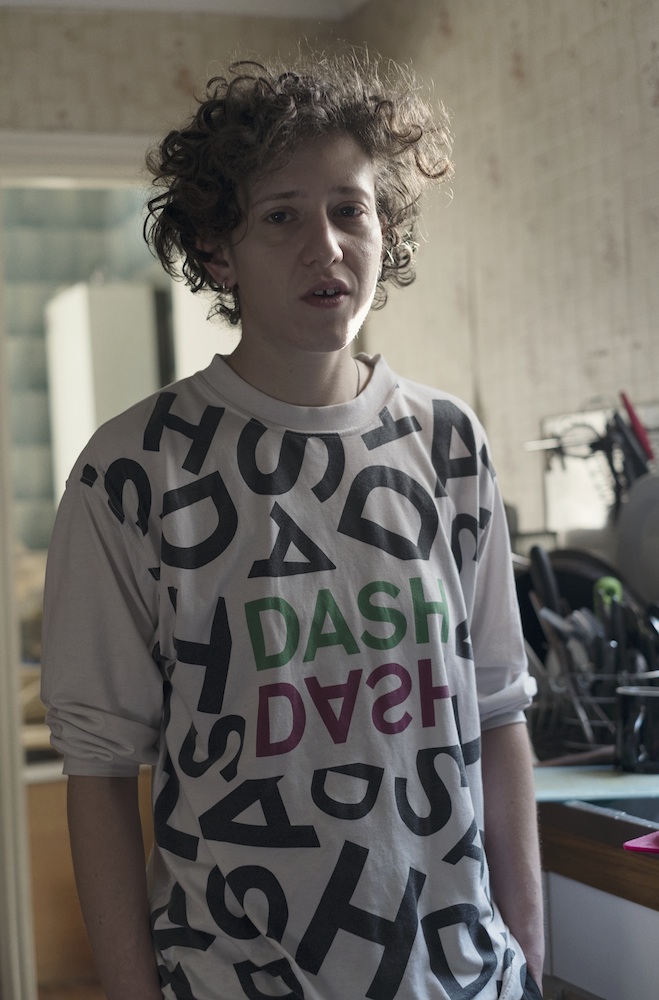Under Mica Levi’s Score
“I don’t have a problem coming up with ideas,” Micachu and the Shapes front woman Mica Levi explains. “It’s about seeing those ideas through to the end.” Whether she’s fashioning handmade instruments out of light bulbs or creating mixtapes for the London club scene, Levi has made a name for herself in the boundary-blurring genre of experimental pop. Her latest venture, composing the score to Jonathon Glazer’s science fiction film Under the Skin, also features her characteristic experimentation with discord and sound manipulation. “The ideas came in a week,” Levi says. “The rest of the time was spent trying to make it work and make sense.”
Under the Skin follows an alien (a wholly unrecognizable Scarlett Johansson) who eerily canvasses Glasgow, Scotland in an ominous white van, seducing men in order to harvest their bodies for vague, extraterrestrial-benefitting purposes. Reviews of the film take the concept of “polarizing” to a whole new level—it provoked equally enthusiastic cheers and booing at the Venice Film Festival. Yet Glazer’s courageous, if sometimes misunderstood, vision is brilliantly held together by Levi’s evocative, metronymic score. Its percussive undercurrent is layered with high-pitched strings and fragments of alien language, while swelling chords evoke the alien’s emergent emotions and humanity. Despite the film’s art-house ties and far-fetched premise, Levi connected with the project by finding the relatable in Johansson’s character.
Now 26 years old, the British musician began playing the violin at the age of four, and trained at the Purcell School as a classical violinist and violist, followed by the Guildhall School of Music, from which she has a degree in composing. Levi performed in concertos with the London Sinfonietta before she was 21, and was also the youngest person to be offered an Artist-in-Residence role at London’s prestigious Southbank Centre. Glazer, who has directed a number of acclaimed music videos since the mid-1990s, considered several known film composers for Under the Skin, but his ultimate vision for the film’s soundtrack required a new voice. He and music supervisor Peter Raeburn approached Levi after hearing her work with Micachu and the Shapes, and the three embarked upon a 10-month long journey creating the film’s otherworldly score.
ADRIAN RAPAZZINI: Can you tell me a bit about how you became attached to Under the Skin?
MICA LEVI: The director [Jonathan Glazer] and the music producer, Peter Raeburn, got in touch with me. I didn’t know how involved I was, even while I was working on it, until quite a ways in.
RAPAZZINI: Were you nervous about jumping into such a high-profile film?
LEVI: Well, I felt like it was so far-fetched I didn’t really have anything to lose. I felt like it was so far-fetched it didn’t really matter. So kind of, but not really.
RAPAZZINI: Do you think that part of the appeal of working with you was that you hadn’t composed for a film before?
LEVI: Yeah, I think that might have been part of the appeal. I’ve seen plenty of films, but I suppose being new to film composition means you’re not too affected by the techniques.
RAPAZZINI: Did you connect with the story of Under the Skin in a personal way?
LEVI: I absolutely did. I had to. That’s what I was told to do, was to just go on [Scarlett Johansson’s character’s] trip with her. I tried to get immersed in her, and tried to figure her out. And I suppose the only way I could do that was in relation to me, and experiences close to me. [The character] has these experiences, these floods of feelings for the first time. And for me, when I was a teenager, I would have these extreme floods of feelings and it would be pretty wild and out of control and might cause me to do something. I’m more used to those feelings—now that I’m all sorted and grown up and know how to do life perfectly. [laughs] Now, I wouldn’t necessarily react in that sort of way. But in the film, she goes along with those feelings so much, and she ends up having these crazy experiences. She’s high on it.
RAPAZZINI: How did you use specific sounds to reflect the otherworldly elements of Johansson’s character and the overall film?
LEVI: Certain sounds are distorted and perverted through different techniques, like slowing down. For me, the use of midi strings alongside real strings explained the situation of real and fake and felt like a good mix of synthetic and real. Percussion strings and fake strings were the main bulk of the score, which also has a lot of cymbal rolls—those are meant to represent the cosmos and nature. There’s the seducing tune that’s like [the character’s] make-up. She sort of plays that to reel [her victims] in. Then you’ve got the sense of love and emotions, which comes across in the form of a triad, which are these fake synthesized strings. And then you’ve got this impossible, alien, complex life form that’s erratic and goes on and on.
RAPAZZINI: And how did the process of composing work?
LEVI: I was given a version of the film that was basically a rough draft on its way to the final form. It wasn’t locked; it was still finding itself and finding its finished form. But the tone of it and the feel of it were definitely established, from a “cut” point of view. And I worked on it every day. Jon would come in three times a week; he was a really close part of it. I was working at Soundtree Studios writing it, and Peter Raeburn was overseeing it. I worked on it for about 10 months.
RAPAZZINI: Were you given a specific musical direction by Jonathon and Peter?
LEVI: What was great about getting direction from Jon was that there wasn’t any musical terminology that was thrown around. The direction was abstract, or more of a discussion about what’s going on. He talked about the film as if it had a life of its own once it had been put together. So I got directed, but I wasn’t too dictated in terms of material, because that was my job—to have an instinct on that. That was my primary role, to really try and go with that, and then Peter, Jon and I developed those ideas together.
RAPAZZINI: Did you ever get the composer’s version of writer’s block?
LEVI: I can’t really remember! I don’t think so. It was more about finishing things. That was the challenge in this: working out how to finish the score and maintaining the balance of the film throughout the score.
RAPAZZINI: Did you have any particular sources of inspiration while you were composing?
LEVI: Well, I’ve seen so much stuff and I’ve heard so much music in my life, so there’s a hell of a lot of influences going on. But throughout this process, I really tried to steer away from listening to anything, because it’s already there anyway. I was worried—especially because I was a novice—that I would be porous and just rip it off. I’ve seen a lot of films and old-school movies that I like, but I’m not really a film buff either. I think a lot of influence probably came from the classical pieces that I played growing up, and I had to get used to writing songs in different forms, because the longer form of the film was different for me. But I suppose hearing those pieces when I was young really helped me, and the form of the film offered inspiration as well. But nothing particularly. I tried to take my head out of that.
UNDER THE SKIN COMES OUT IN LIMITED RELEASE TOMORROW, APRIL 4. FOR MORE ON MICA LEVI AND MICACHU AND THE SHAPES, VISIT LEVI’S FACEBOOK PAGE.







